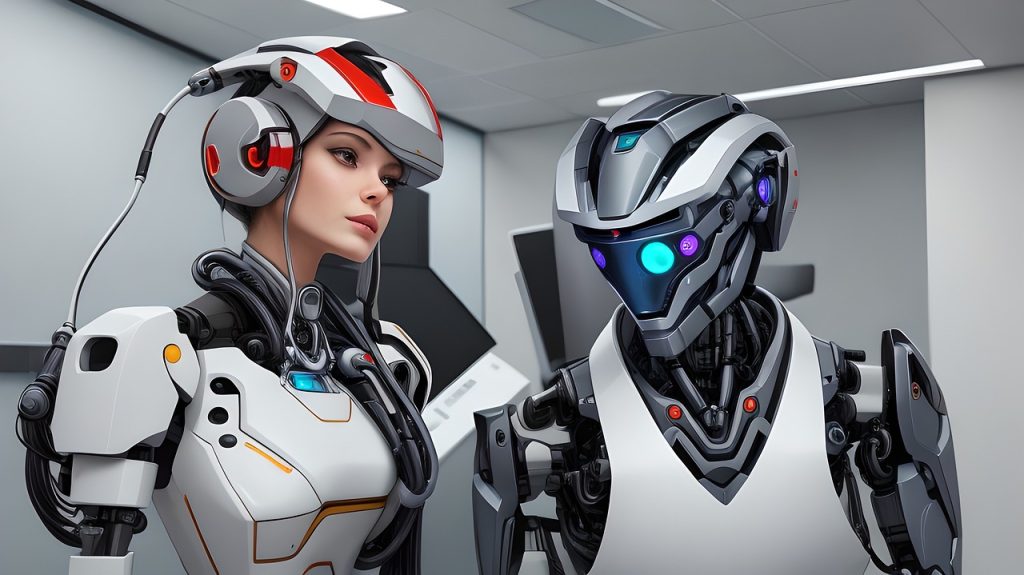Advancements in Robotics for Healthcare
Imagine a world where robots and technology work seamlessly alongside healthcare professionals, enhancing patient care and revolutionizing the field as we know it. In recent years, remarkable advancements in robotics have paved the way for this futuristic vision to become a reality. From surgical robots performing complex procedures with precision, to companion robots providing emotional support to patients, the applications for robotics in healthcare are expanding at an astonishing pace. In this article, we will explore the fascinating evolution of robotics in healthcare and the incredible ways in which these advancements are improving the lives of patients and healthcare providers alike. So buckle up and prepare to be amazed by the incredible progress being made in this cutting-edge field.
Table of Contents
ToggleAdvancements in Robotics for Healthcare
Welcome to a comprehensive article on the exciting advancements in robotics for healthcare! In recent years, the field of robotics has made significant strides in revolutionizing various aspects of healthcare, from surgical procedures to rehabilitation and elderly care. In this article, we will explore the use of robotics in different healthcare domains and discuss the precision, accuracy, and non-invasiveness they bring to these procedures. We will also delve into the remarkable potential of robotics in patient monitoring, pharmacy and medication management, as well as ethical considerations associated with this groundbreaking technology.

Use of Robotics in Surgical Procedures
Robotics technology has transformed the landscape of surgical procedures, enabling surgeons to perform highly precise and minimally invasive surgeries. Robotic surgical systems, such as the da Vinci Surgical System, have become widely adopted across the globe. These systems consist of robotic arms controlled by surgeons, who operate from a console equipped with a high-definition three-dimensional visualization system. With robotic assistance, surgeons can make smaller incisions, resulting in reduced blood loss, shorter hospital stays, and faster recovery for patients.
Precision and Accuracy in Robotic Surgery
One of the most significant advantages of robotic surgery is the unparalleled precision and accuracy it offers. The robotic arms utilized in surgical procedures eliminate any hand tremors and provide enhanced dexterity, allowing for precise movements. The robotic instruments also offer a greater range of motion compared to human hands, improving the surgeon’s capabilities. As a result, surgeons can perform delicate and complex procedures with the utmost precision, minimizing the risk of errors and complications.

Non-Invasive Robotic Procedures
In addition to enhancing precision, robotics has paved the way for non-invasive procedures that offer numerous benefits to patients. Robots equipped with advanced imaging and sensor technologies can perform diagnostic procedures without the need for invasive techniques, such as biopsies. These non-invasive procedures reduce patient discomfort, decrease the risk of infection, and lead to quicker recovery times. Furthermore, non-invasive robotic procedures enable healthcare professionals to monitor and treat patients without disrupting their daily activities or compromising their quality of life.
Robotic Rehabilitation for Physical Therapy
Robotics technology has also made substantial contributions to the field of physical therapy and rehabilitation. Rehabilitation robots can assist patients in regaining their mobility and functionality following injuries or surgeries. These robots are designed to guide patients through a range of motion exercises, providing precise and targeted therapy. By monitoring patients’ movements and adjusting the resistance and intensity of exercises, robotic rehabilitation systems can personalize treatment plans and optimize rehabilitation outcomes.

Assistance and Support Robots for Elderly Care
The aging population has prompted the development of robots that can provide assistance and support to older adults. These robots can help with daily tasks, such as medication reminders, meal preparation, and mobility assistance. Additionally, social robots designed for elderly care offer companionship and emotional support, reducing loneliness and improving overall well-being. By integrating artificial intelligence and machine learning, these robots can adapt to individual needs and preferences, ensuring personalized care for elderly individuals.
Robotic Prosthetics and Orthotics
Advancements in robotics have revolutionized the field of prosthetics and orthotics, significantly improving the quality of life for individuals with limb loss or musculoskeletal conditions. Robotic prosthetics offer enhanced mobility and functionality, allowing users to perform complex movements with ease. These prosthetic devices can be controlled using intuitive interfaces, such as neural interfaces or myoelectric sensors, enabling users to control their prostheses with their thoughts or muscle signals. Robotic orthotic devices, on the other hand, provide support and assistance for individuals with muscle weakness or paralysis, allowing them to regain independence and mobility.
Robotic Assistance in Diagnosis
Robotics technology is playing an increasingly integral role in diagnosing various medical conditions. Diagnostic robots equipped with advanced imaging and sensor technologies can collect and analyze patient data, aiding healthcare professionals in making accurate diagnoses. For instance, robots can perform ultrasound scans or conduct a comprehensive analysis of medical images, helping radiologists identify abnormalities. By automating certain diagnostic procedures, robots can expedite the diagnostic process, allowing for earlier detection and improved patient outcomes.
Patient Monitoring with Robotics
Real-time patient monitoring is crucial in healthcare settings, and robotics technology has emerged as a promising solution. Robots equipped with sensors can continuously monitor vital signs, such as heart rate, blood pressure, and oxygen levels, ensuring early detection of any abnormalities. Moreover, these robots can assist in remote patient monitoring, enabling healthcare professionals to track patients’ health status even when they are not physically present. The seamless integration of robotics in patient monitoring enhances efficiency and accuracy, ultimately improving patient care and reducing healthcare costs.
Robotics in Pharmacy and Medication Management
The use of robotics in pharmacy and medication management has significantly streamlined these processes, minimizing errors and improving efficiency. Robotic systems can accurately dispense medications, reducing the risk of medication errors caused by human factors such as fatigue or distraction. Additionally, robotics technology enables precision in labeling, packaging, and inventory management, ensuring the right medication reaches the right patient at the right time. By automating these tasks, healthcare professionals can focus more on patient care, thus enhancing overall quality of care.
Ethical Considerations in Robotics for Healthcare
As robotics technology continues to advance in the healthcare sector, ethical considerations become paramount. It is crucial to address concerns related to patient privacy and data security when dealing with robots that collect and process sensitive patient information. Additionally, questions surrounding the liability and accountability of robotic systems, especially in the event of errors or malfunctions, need to be carefully addressed. Furthermore, ensuring equitable access to robotic healthcare technologies is essential, as disparities in access could exacerbate existing healthcare inequalities. Striking the right balance between innovation and responsible implementation will be crucial to navigating the ethical landscape of robotics in healthcare.
In conclusion, the advancements in robotics for healthcare have transformed various aspects of the field, ranging from surgical procedures and rehabilitation to elderly care and diagnosis. With increased precision, accuracy, and non-invasiveness, robotics has improved patient outcomes and enhanced the efficiency of healthcare delivery. As the field continues to evolve, addressing ethical considerations and ensuring equitable access will be crucial to leverage the full potential of robotics in healthcare and provide the best possible care for all individuals.
Discover the remarkable advancements in robotics for healthcare, from surgical precision to personalized rehabilitation and elderly care. Explore the potential and ethical considerations of this groundbreaking technology.
Discover the remarkable advancements in robotics for healthcare, from surgical precision to personalized rehabilitation and elderly care. Explore the potential and ethical considerations of this groundbreaking technology.